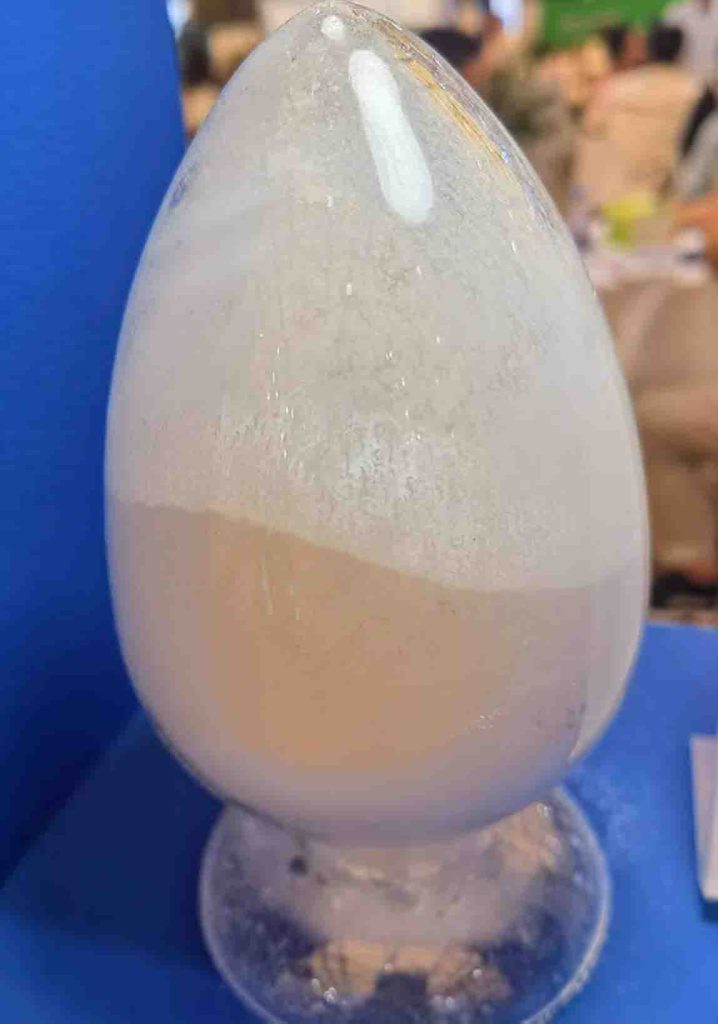Suspending Agent
Definition of Suspending Agent
A “suspending agent” is a material or chemical used in different industries to keep solid bits from sinking to the bottom of a solution or liquid. It is a very important part of making sure that goods with solid parts stay stable, uniform, and work at their best.
Organoclay from Zhejiang Camp-Shinning is a suspending agent that works very well at what it does. It is made by mineral clays and then changed chemically to make it stick to organic materials better. In this process, cations that can be exchanged in the clay structure are replaced with organic cations. This turns the clay into a material that likes to bond with organic molecules.
By using organoclay as a suspending agent, producers can make sure that solid ingredients are spread out evenly throughout their formulas and don’t settle or settle out. This feature makes goods much more stable and helps them last longer. It also makes them look better, work better, and be easier to use.
Purpose of a Suspending Agent
When we add organoclay as a suspending agent, our main aim is to make sure that the solid particles in our formulation are evenly spread out. If a product doesn’t have a proper suspending agent, then its solid particles will eventually settle at the bottom. This can cause the product to separate into different phases and not work as well. Organoclay is a solution that helps to keep solid particles suspended, which helps to maintain the stability and consistency of the product.
When making paints, coatings, and adhesives, adding organoclay helps to prevent the pigment from settling. This makes sure that the color is evenly distributed and improves the overall appearance of the product. Organoclay is a substance that helps to keep solid additives suspended in drilling fluids. This is important because it prevents blockages and helps to maintain the desired properties of the fluid, which is essential for efficient drilling operations.
Types of Suspending Agent
At present, there exist four distinct kinds of Suspending Agents. Various industries use different types of suspending agents for specific purposes. The agents that suspend things in the product help to make sure it stays stable and consistent, and also improves how well it works in many different situations.
Bentonite Suspending Agent
Advantage of Bentonite Organophilic Suspending Agent
Organophilic bentonite is a good option to consider when looking for a suspending agent due to its unique characteristics and the benefits it offers in various applications. There are advantages to using organophilic bentonite as a suspending agent.
Organophilic bentonite is useful in preventing solid particles from settling in liquid formulations, thereby enhancing their suspension stability. Due to its exceptional swelling properties and large surface area, it has the ability to efficiently absorb and suspend solid materials. When it comes to industries such as paints, coatings, and drilling fluids, it’s crucial to maintain an even suspension of the mixture in order to achieve optimal performance. This quality is particularly beneficial in certain fields.
This substance is also capable of exhibiting thixotropic properties. This means that it can alter its thickness or viscosity when it experiences shear stress, and then revert back to its original state. When you stir or apply force to the substance, it becomes less viscous, which makes it easier to mix and apply. When the force that causes the shear stress is removed, the substance becomes more viscous. This helps to prevent the particles from moving around freely. Organophilic bentonite’s thixotropic nature is advantageous for industries that require flow control and easy application.
Applications of Organoclay Suspending Agent
Organoclay is a really useful and adaptable substance that can be used to suspend things effectively. It’s used in a lot of different industries. Organoclay suspending agents have a variety of common applications.
- Paints and Coatings
- Oil-based Drilling Fluids
- Adhesives
- Sealants
- Emulsion Polymerization
- Pharmaceuticals
- Ceramic Slurries
Organophilic Suspending Agent for Suspension
An organophilic suspending agent is a substance that helps to keep solid particles suspended in a liquid medium. This substance has an affinity for organic compounds, which allows it to effectively disperse and spread solid materials.
Drilling fluids that are based on oil typically have suspending agents that are organophilic. These substances help to prevent solid additives such as barite and drill cuttings from settling at the bottom of the fluid by suspending and dispersing them. It’s crucial to maintain stability and optimal performance of the drilling fluid to ensure that drilling operations go smoothly and efficiently.
In emulsion polymerization processes, we use organophilic suspending agents to keep the polymer particles suspended and stable in the liquid phase. These substances help to prevent the polymer particles from clumping and settling during the polymerization process. As a result, the particle sizes are more evenly distributed, resulting in a higher quality product overall.
In the world of paints and coatings, it’s pretty common to use agents that are attracted to organic substances and can suspend them. This is especially true for products that are solvent-based. The primary purpose of these substances is to ensure that pigments, fillers, and other solid components are uniformly dispersed in a liquid medium. This helps to stop the particles from sinking to the bottom and guarantees that the mixture remains uniform. This product aids in achieving consistent color, enhancing the flow of paint or coating, and improving its overall performance.
Difference of Suspending Agent Vs. Thickening Agent
Suspending agents are used to stop solid particles from settling or forming sediment in a liquid. These substances assist in maintaining an even distribution of solid particles throughout the mixture, which helps to keep it stable and prevents separation.
Organoclay serves the dual purpose of being a substance that suspends and thickens. Organoclay has a dual functionality that offers multiple benefits because it acts as both a suspending agent and a thickening agent. This process helps to keep solid particles evenly distributed in the liquid, preventing them from settling or separating. Additionally, it makes the liquid thicker and more viscous. Organoclay is a really useful additive in many different industries because it can be used in a lot of different ways. It helps make products work better and can be used to make them even better than before.
Is Bentonite an Emulsifying Agent or Suspending Agent?
Emulsifying agents are substances that help to stabilize and create emulsions. They do this by reducing the tension between the two liquids that don’t normally mix and preventing them from separating into different layers. Their main focus is on the formation and stability of emulsions. Suspension agents are used to keep solid particles evenly dispersed in a liquid, so they don’t settle to the bottom and the mixture stays stable.
Bentonite can function as both an emulsifying and suspending agent. Bentonite clay and layered double hydroxide work well together to create a powerful emulsifying system. The layered double hydroxide helps to keep emulsions stable by acting as a stabilizer. When bentonite and layered double hydroxide are combined, they work together to improve the ability of the organoclay to emulsify. This is known as a synergistic effect.
Organoclay bentonite is really good at stabilizing suspensions. When you mix it with water, it creates a structure that helps to keep solid particles suspended and evenly distributed. When bentonite clay is modified organically, it becomes more attracted to organic compounds. This helps to evenly spread and stabilize solid particles that are suspended in the mixture.


